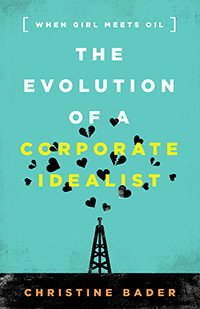What’s it like to join a multinational corporation with the goal of helping it behave more responsibly? Corporate employees who fall into this category come from a variety of backgrounds. Often they have previous experience in civic or nonprofit organizations. They are attracted by the opportunity to use the considerable resources of a private-sector organization to leverage their expertise and their social commitment. These advocates of corporate social responsibility are all around us: Almost every major corporation has one or more of them on its payroll.
Yet for all the evident interest in CSR, especially among MBA students, remarkably few accounts cover the experiences of those who work that field. The Evolution of a Corporate Idealist, by Christine Bader, is a brief, well-written book that fills this important gap.
When Bader was an MBA candidate at the Yale School of Management, she attended a speech by John Browne, then the CEO of BP (formerly British Petroleum). Inspired by what he said, Bader went to work for the company, first as a summer intern in London and then as an employee. In a posting to Indonesia, she worked to ameliorate the social and environmental impacts of a new energy project. She subsequently helped to enhance worker and community safety for a chemical joint venture in China. Then she moved to BP’s London headquarters, where she was able to devote part of her time to working on a UN human rights initiative. “I fell in love with BP,” Bader writes. “And BP loved me back… . I was living the cliché of doing well and doing good.”
In 2008, she left BP to work full time on the UN initiative. Two years later, the Deepwater Horizon oil rig exploded in the Gulf of Mexico, and BP, which was leasing the rig, bore responsibility for the cleanup. The accident—and BP’s response to it—broke Bader’s heart. She began to wonder if her nine-year love affair with BP had been “a sham,” she recalls. Yet she ends her account on a relatively optimistic note. As the book’s title suggests, she remains a “corporate idealist,” even as her understanding of business-world realities has undergone an “evolution.” Throughout the book, she recounts the mixed but generally positive experiences of CSR leaders in other corporations.
The most fascinating parts of the book deal with Bader’s experiences in Indonesia and China. These sections graphically reveal the practical difficulties faced by a corporate idealist who tries to affect corporate policies on the ground. Like her counterparts in other firms, she came to absorb a vital lesson: “Corporate Idealists often have to operate without a road map.” They also have to take satisfaction in what they are able to accomplish, despite the compromises that they must make along the way.
An important skill that Bader had to learn—and it is impressive to watch how this skill evolved—was the ability to talk to the executives at BP whose support she needed in order to embed social and environmental concerns in the company’s business operations. Some executives shared her commitment; others were skeptical. She needed to persuade the latter group that acting more responsibly was in their best interest and in the firm’s best interest. Her strategy was to emphasize not so much the benefits of acting more responsibly (which is hard to do, because CSR activities can lead to delays and higher costs), but the risks of not doing so. Her account reveals the extent to which strong interpersonal skills are critical to advocating social change within a corporation. It also demonstrates the extent to which risk avoidance remains one of the most effective drivers of CSR commitment.
An equally important challenge was to figure out how to act “responsibly” in a difficult host-country environment. In Papua New Guinea, BP was planning to build a large liquefied-natural-gas plant. Commendably, the company aimed to do so in a way that respected the well-being of the indigenous community, and it put considerable resources into community development. Beyond BP’s control, however, were decisions made by the Indonesian government about how to use the substantial revenues that the project would generate.
In one revealing anecdote, Bader discusses BP’s effort to persuade its construction partner in China to improve workplace safety. BP leaders warned a manager at the construction company that a major accident at a BP work site would lead to unfavorable publicity. “But we wouldn’t let the media know what’s happened,” the manager confidently assured them.
Among big multinationals, BP stands out: Few firms have managed to be both so roundly applauded and so thoroughly vilified. Bader came to understand that the firm’s shortcomings don’t obviate the value of the considerable accomplishments that she helped to enable at BP. Many firms have both CSR achievements and limitations. The challenge for corporate idealists is to continue pushing for greater achievement without letting the limitations discourage them. This engaging book offers useful if sobering lessons on how to meet that challenge.


